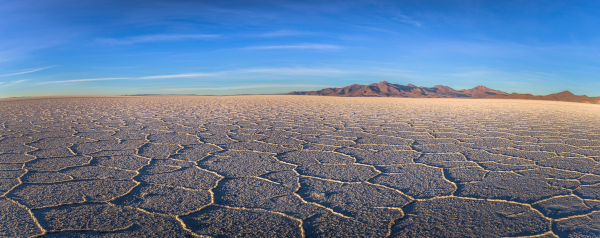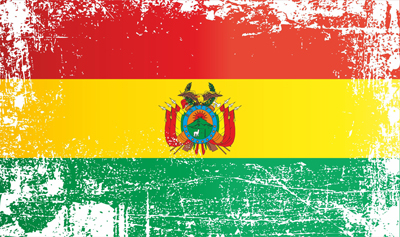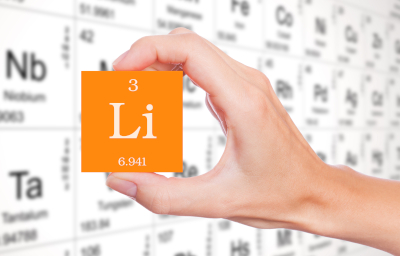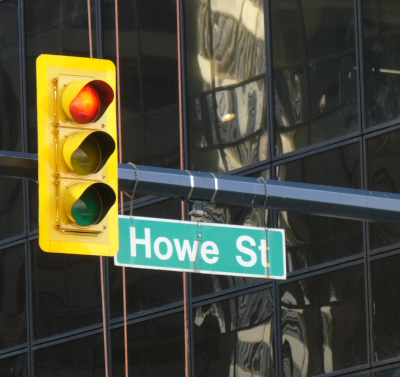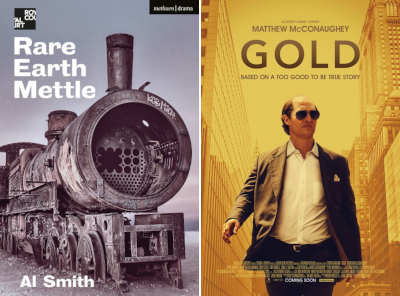
Reflections on Vancouver, British Columbia and other topics, related or not
Rare earth muddle
An ignorant British script set in Bolivia
shows up Canadian writers
Greg Klein | January 29, 2022
Bolivia’s Salar de Uyuni holds unrealized
potential to supply much of the world’s lithium.
(Photo: Shutterstock)
This play ran in London late last year but couldn’t be performed in Canada. A white writer not only dared to portray aboriginals (genocide, by Canadian standards) but depicted a native prime minister as an opportunist (genocide again). Not even the story’s foil, a noble savage/diamond in the rough/salt of the non-rare earth salt flat/exemplar of moral superiority can redeem the multi-genocidal mass graves atrocity of this genocidal cultural appropriation.
More importantly, it’s a bad play.
But from a Canadian perspective, it’s noteworthy that Al Smith’s Rare Earth Mettle tries to address a subject that could just as well have been Canadian. It’s about people who want to mine land claimed by natives.
The land sits near Potosí, Bolivia’s notorious mountain of silver. The mine would extract lithium (not a rare earth element, despite the play’s title). Smith styles one of the rival proponents on Elon Musk and Tesla, but without Musk’s space travel and other ventures, and without Tesla’s investor base. Henry Finn owns Edison Motors outright. (Accusations of anti-Semitism forced Smith to change the name from Hershel Fink.)
A fantastically rich Californian entrepreneur who became a celebrity by exploiting “green” consumerism, Finn struggles to live up to his rep as a charismatic visionary. He desperately needs more lithium, lots more, to build enough batteries for his eagerly anticipated new electric car.
To win over a reluctant native who claims the entire lithium-rich salt flat, Finn competes with an English scientist who wants the metal for its mood-altering attributes. (It’s also used to treat bipolar disorder.) She hopes to boost her career by doping the drinking water in Britain’s most depressed neighbourhood, and to hell with the lab-rat residents’ knowledge, consent, side effects and other ethical nuisances.
Bolivia’s mining experience, especially with Spanish
and British interests, provokes strong community opposition.
(Image: Shutterstock)
Smith indulges fanciful figures but Bolivia does host the world’s largest lithium potential, maybe up to a quarter of the global total. However the country’s governments have a reputation for reneging on mining deals and local communities often oppose the industry. That’s explained by first-hand experience as well as history.
Would-be miners face additional challenges ranging from inadequate infrastructure to processing difficulties unique to Bolivia’s lithium. Chile and Argentina have proved much more bountiful for viable supplies of the stuff.
Smith doesn’t so much gloss over these drawbacks as appear ignorant of them. He reveals further ignorance with characters who speak confidently of getting lithium from China or Afghanistan. China’s well known for weaponizing resources, such as its near-monopoly on rare earths. Afghanistan’s incorrigible instability has blocked development of supposedly phenomenal mineral potential, although that might change now that China has been cozying up to the Taliban.
Lithium has simplistically been touted
as an environmental “solution.”
(Image: Shutterstock)
If Smith has recently learned about the environmental drawbacks of environmental “solutions” like lithium, he might be surprised to hear about human rights violations. No end of green machines, digital devices and other high-tech gear rely on crimes ranging from inhumane factory conditions in China to forced-labour mines in the Democratic Republic of Congo, to name just a couple.
So from the perspective of anyone concerned about critical supply chains, geopolitical stability or workers’ rights, Smith has nothing to say. From any other perspective, his story presents another cliche of venal whites contrasted with one or more non-white paragons of virtue. Smith’s creative efforts further fizzle with what he probably considers a novel plot twist—the invention of a new native tribe consisting of just one person. It’s already been done here, and not in fiction.
But superficial as he is, Smith does show up Canadian writers for their lack of interest in Canadian themes and people.
Outside the industry it’s almost Canada’s best-kept secret that this country is a world leader—the world leader by some accounts—in mining. That results not just from Canada’s own natural resources but the expertise and money Canada exports to other mining jurisdictions. Believe it or not, Vancouver’s sometimes called the mining capital of the world.
A great big caveat must accompany that last boast. It’s based on the number of mineral exploration companies headquartered here. Although often referred to as “junior miners,” these penny stock outfits rarely operate mines. In theory they search this country and the world for economic deposits of metals, minerals, gems and other sub-surface stuff that people will pay for.
The likelihood of finding that is slim indeed. Success depends on actually discovering a deposit, then advancing through maybe more than a decade of geoscientific, metallurgical, engineering, environmental and economic studies, while negotiating government and aboriginal permission. On occasions when Vancouver-based companies make significant progress, they usually sell the project to a bigger outfit, sometimes a real miner and often foreign. Canada’s willingness to sell out to foreigners explains why Australia holds the lead for big mining companies.
Mining stock promoters made Vancouver’s
Howe Street central to the “scam capital of the world.”
The true goal of most junior miners, unspoken but well-understood by insiders, isn’t finding and developing a deposit. It’s raising money on the stock market. These companies have no revenue because they produce no goods or services and, given the hustler mindset of the companies’ principals, absolutely no aptitude for providing goods or services. They get money by selling shares. To do so, they hype no-hope projects.
The money they raise mostly goes into management pockets and expense accounts. Then there’s promotion, conducted through worldwide junkets and paid shills. That too rates bigger spending than the ostensible projects. Quick bursts of windfall booty come from stock manipulation, especially pumping and dumping. It’s a crazy world that’s probably richer in fictional than investment opportunities.
That’s long been the case, as has been documented in non-fiction. Margaret Ormsby depicted the late-1800s mania in her classic 1958 work British Columbia: A History. More extensively, the “scam capital of the world” came under scrutiny in the 1987 exposé by David Cruise and Alison Griffiths, Fleecing the Lamb: The Inside Story of the Vancouver Stock Exchange. Books by Matthew Hart have also covered the sector and its denizens, both on Howe Street and in the field. (Some outstanding examples include his chapters on legendary promoter Murray the Pez and on 20-something geologist Eira Thomas.) Treasure Under the Tundra by L.D. Cross went beyond the stock hustles to maniac adventurer Chuck Fipke, who triggered history’s greatest mining rush.
If all these people really existed, if all that shit really happened, just imagine the fictional potential. Beyond the paleskins, there’s taboo-breaking inspiration from the likes of Lana Eagle, Adam Olsen, Theresa Spence and Tracy Fleck (aka Tracy Samra). Possibilities run the gamut from lampoonish hypocrisy and farcical greed to old-fashioned frontier adventure, epic stories of international rivalry and dystopian nightmares of supply chain fragility.
Couldn’t Canadian writers raise
themselves to this level of ignorance?
Yet it took Hollywood to appropriate and Americanize another Canadian gift to mining, the industry’s biggest-ever scam. Canadian-run, Calgary-headquartered Bre-X became an American-run, Reno-headquartered fraud in the 2017 movie Gold. Some who have sat through the film say the real story was even more outrageous.
Canada’s literati misses all that, along with just about everything else about this country. Alice Munro stands apart, and a few tentative exceptions might exist. But overall, Canadian writers don’t know Canada, Canadians or anyone at all for that matter.
And now the Canadian hustle ain’t what it used to be. Developments ranging from economic uncertainty to ideological animosity have demoralized the industry. Punters seem to be taking their money and gullibility elsewhere. Other aspects of Vancouver corruption, moreover, have far surpassed the scam capital’s stock hustlers. Looming much larger are Chinese machinations and possibly the world’s biggest poverty pimp industrial complex. The former is more dangerous but the latter is especially sickening for its uncontested hypocrisy.
Yet these are subjects that Canadian writers could treat only with Turdeauvian sympathy.
As for portrayals of Vancouver mining, God help us if this is all we’ve got.
